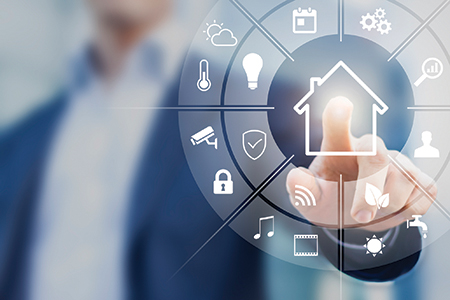Potential homebuyers are looking to buy smart, even if they have to pay more to do it.
Buying “smart” means purchasing a home with pre-installed smart home technology, a trend that’s reinvigorating real estate. Smart technology refers to devices that are connected to the internet and can be controlled and monitored from any location via your smartphone, tablet or computer.
From single mothers to married couples entering retirement, owners of smart homes spend less time and energy managing their homes and more of their valuable resources on career goals, personal relationships, daily tasks and hobbies. Studies predict that smart homes will be the norm by 2020, and real estate agents need to be well-versed.
According to a recent Coldwell Banker Real Estate Smart Home Marketplace Survey, the four main categories of smart products that are important to homebuyers are security (e.g., locks and alarm systems); temperature (e.g., thermostats and fans); lighting (e.g., lightbulbs and lighting systems); and safety (e.g., fire/carbon monoxide detectors and nightlights).
Homebuyers across the board are most attracted to smart security and temperature. According to the report, Americans prefer security and temperature over smart appliances and entertainment. Older generations are more likely to have these types of smart home technology: 40 percent of homeowners over 65 years of age have smart temperature products, compared to 25 percent of millennials.
Potential homebuyers of all ages and genders are interested in smart home technology. In fact, 45 percent of Americans either have smart home devices or plan to incorporate them. Of respondents who said they have smart products in their homes, 43 percent are millennials, 33 percent are between 33 and 54 years of age, and 24 percent are 55 and older. Of these, 57 percent are male and 43 percent are female.
Agents looking to work with smart homes need to pay close attention to women homebuyers, a fast-growing segment. Smart home technology may be a valuable resource for increasing women’s homeownership, as single women—especially those with families—will be attracted to owning a home that makes their lives easier and makes them feel safe.
Not only are smart homes safer, but they also have high value. Homebuyers and sellers are willing to pay more for homes with smart technology. Fifty-four percent of homeowners said they would install smart home products if doing so would ensure they could sell their homes faster. Of these, 65 percent said they would pay $1,500 or more. For millennials, this number increases to 72 percent.
Real estate agents can utilize this information in selling homes at a faster rate and higher price to potential homebuyers who understand the value of smart homes. Make sure the homes you sell are equipped with eye-catching smart technology, and communicate to potential buyers the increased value these devices bring to their home and the safety they bring to their families.
Desirée Patno is president and CEO of the National Association of Women in Real Estate Businesses (NAWRB).
For more information, please visit www.nawrb.com.
For the latest real estate news and trends, bookmark RISMedia.com.











